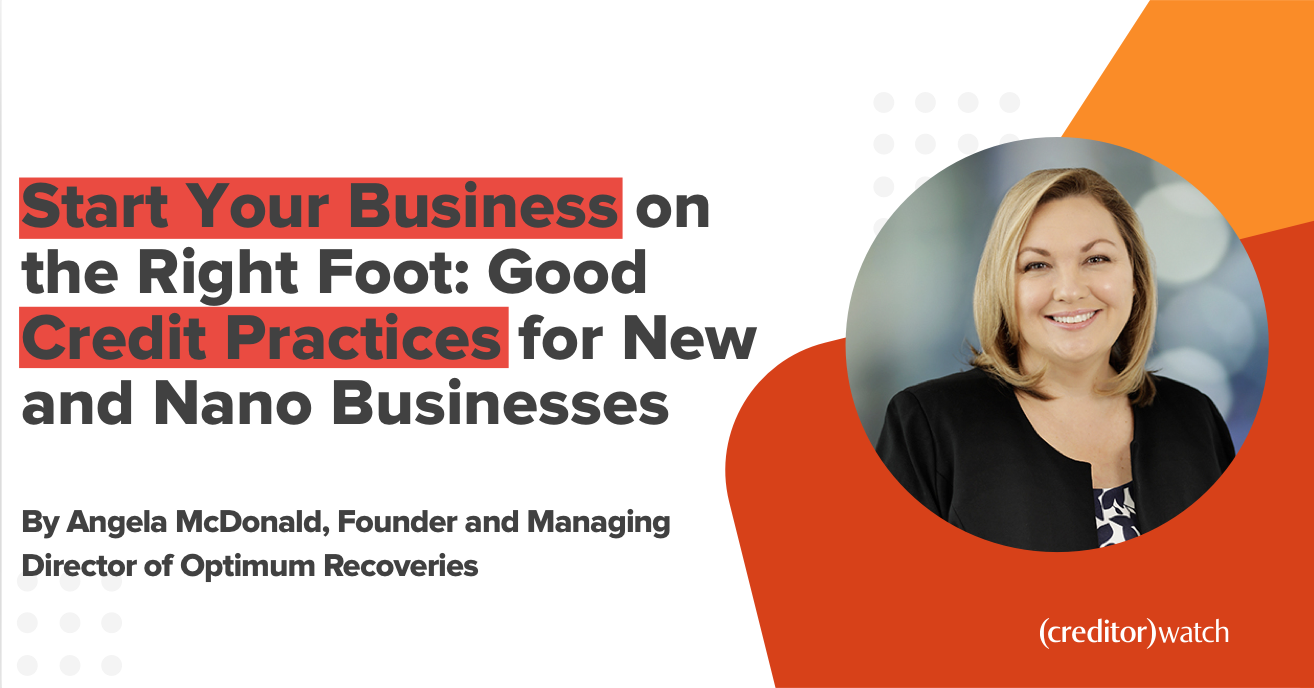By Angela McDonald, Founder & Managing Director of Optimum Recoveries
If there was ever a time to start your own small or nano business, it’s now. Australian Bureau of Statistics’ figures show there has been a 3.8 per cent rise in the number of businesses formed in the year to 30 June 2021. With the pressures of COVID leading to unemployment or under-employment, many people are taking matters in to their own hands and setting up a side hustles from home, or taking the plunge to finally create a start-up for their passion project.
When starting a new business, setting good credit management processes and credit references is often far from the first thing you think about. Setting up a business is really exciting and it’s easy to focus all your attentions on developing products, services, marketing templates and getting going. But it’s equally as important to pay attention to your credit policies and credit history as every dollar of revenue your business makes goes through a credit policy assessment process.
Think about your credit policy as a key part of your business plan when getting started. Essential factors to consider include how you verify whether to extend credit to a potential customer and even whether to offer payment terms at all.
Taking the First Step: Defining Your Terms and Conditions
Developing a strong credit policy from the get go can help you avoid any liabilities and long, sleepless nights well into the future. At Optimum Recoveries, no matter how large a business is or how long they have been operating, our first step is to always to cement strong terms and conditions and credit application. What makes great terms and conditions heavily depends on a number of factors including the state your business is in, which industry you’re a part of, your risk appetite, and even the type of customer you’re going to be doing business with. It is tempting to adopt the payment terms that are standard in your industry, however it is incredibly important to think through specific terms and conditions that are tailored to you and your business.
To begin the foundation for solid terms and conditions, you should:
- Include clear outlines for you and your customer. Your payment terms should clearly outline the parties making the agreement and the agreed scope of work, deliverables, and timeframes in which the work should be completed.
- Make sure your customers can easily understand what you’re saying. Your terms and conditions should be easily read and understood by your customer, without the help of a lawyer. Unclear and hard to interpret terms and conditions can and will hold up or even prevent customers from doing business with you.
- Ensure that your terms are secure, and reflect your customer. The approach you take as a small B2C business will be different to the approach you would take as are B2B firm with large corporates as clients. If your customers are largely consumers, they are already afforded many protections under fair trading rules. If your clients are big businesses, they may offer their own terms for you to consider that could include extended payment terms, which may put cash-flow pressure on your start up.
Your terms and conditions also need to set out how you will be remunerated. As a small B2C business, your terms may be as simple as cash on delivery. However, if you are running a construction firm for example, it is standard practice to require clients to pay a deposit to get the job started and have agreed points during the project where progress payments would be made. For this type of business, it is also important to set out what happens if there’s any variation to agreement, such as project creep, as well as clear outlines of what happens in the event of non-payment or past due.
Securing you interests in your goods in the event of insolvency is another important aspect to consider including in your terms. Securities should be outlined in your terms and agreed to well before any works commence. If you offer high value goods and services, you may wish to register your interest in your goods on the Personal Property Securities Register (PPSR). PPSR is a way to let people know if personal property such as cars, goods or company assets have security interests over them. Registering your credit line and security interest correctly on the PPSR can protect your business and give you extra rights for the property it’s registered over.
Using Digital Tools to Get Your Cash Flowing
There is a plethora of digital tools you can use in both setting up and streamlining your credit management processes and creating sound credit policies. These digital tools can tie in with every asset of your business, making sure you have a healthy and well-managed cash-flow.
If you are running a garden business, for example, you could use digital tools along every step of the payment process, including:
- Xero or MYOB integration with CreditorWatch.
- Using an online tool to allow customers to see your availability to book a job cutting down on administration and response time.
- Setting up a system to email your invoice as soon as your scheduled job is completed.
- Incorporating payment systems directly into your website and offering digital payments such as direct debit, PayPal, and credit card.
- Automating an email which request an upfront review soon after you have finished a job.
These processes make it easier for you to run your business, they also give your customer multiple points at which they are shown the cost of your services and terms and conditions.
- Integrating your accounting software with CreditorWatch easily verifies the credit worthiness of new customers, identifying high risk customers before you work for them.
- Using an online booking system can register a clear quote to be emailed which sets your customer’s expectation.
- Automated invoices sent directly after a job promotes a quick turn around for payments
- Online payment systems make you easy to be paid and allows the customer to use their preferred method.
- Garnering a high review from your customer makes it hard for them to claim they were unhappy with the service you provided and decline to pay.
Many business apps and software tools will also integrate with popular online accounting platforms such as Xero. Setting up automatic CreditorWatch alerts through Xero will let you know if the customers risk profile changes, generate auto-email invoices and schedule reminders, all of which helps to bring the cash into the business as fast as possible.
Establishing Good Credit Practices for New and Nano Businesses
These are some of the steps new and nano businesses can use to set up for success. Getting in touch with a team of credit professionals to help you establish clear systems and processes at the onset of your business can help save you debts in the long run. Having sound credit collection processes in place helps take some of the stress of credit management off of your back so that you have more time to focus on other parts of your new business.
If you’re just starting out, I have an upcoming event at Brisbane Business Hub with the team from CreditorWatch which will help you learn how to protect your business and set yourself up for success. You can come along and join us at 9am November 24 to find out how to safeguard your business against clients who just won’t pay – and enjoy a light breakfast with other small business owners across the region.



